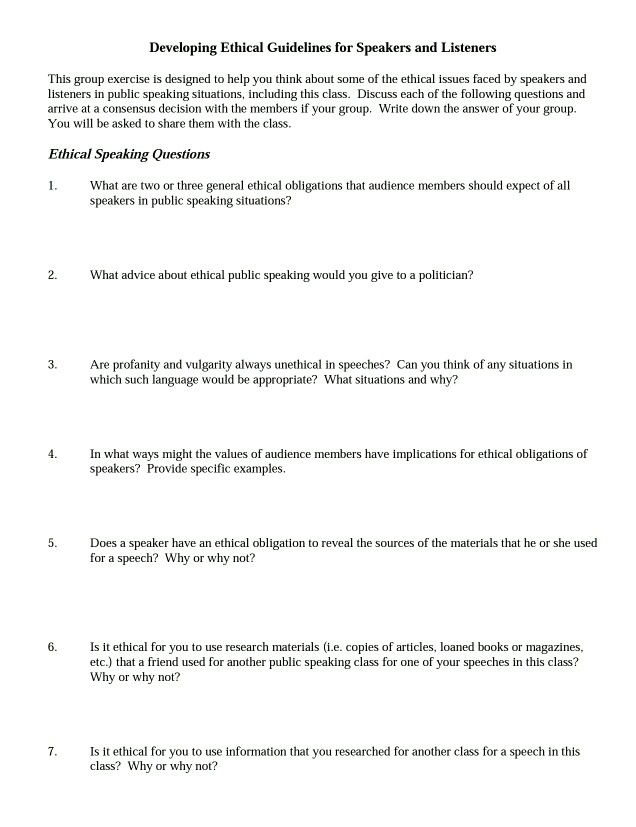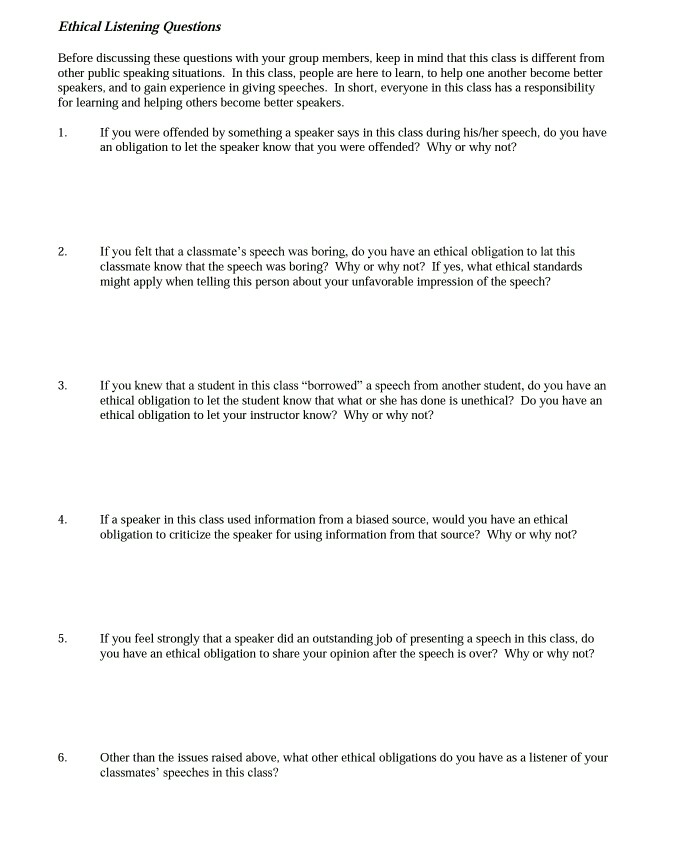Answered step by step
Verified Expert Solution
Question
1 Approved Answer
Developing Ethical Guidelines for Speakers and Listeners This group exercise is designed to help you think about some of the ethical issues faced by


Developing Ethical Guidelines for Speakers and Listeners This group exercise is designed to help you think about some of the ethical issues faced by speakers and listeners in public speaking situations, including this class. Discuss each of the following questions and arrive at a consensus decision with the members if your group. Write down the answer of your group. You will be asked to share them with the class. Ethical Speaking Questions What are two or three general ethical obligations that audience members should expect of all speakers in public speaking situations? 1. 2. What advice about ethical public speaking would you give to a politician? Are profanity and vulgarity always unethical in speeches? Can you think of any situations in which such language would be appropriate? What situations and why? 3. In what ways might the values of audience members have implications for ethical obligations of speakers? Provide specific examples. 4. 5. Does a speaker have an ethical obligation to reveal the sources of the materials that he or she used for a speech? Why or why not? Is it ethical for you to use research materials (i.e. copies of articles, loaned books or magazines, etc.) that a friend used for another public speaking class for one of your speeches in this class? Why or why not? 6. Is it ethical for you to use information that you researched for another class for a speech in this class? Why or why not? 7. Ethical Listening Questions Before discussing these questions with your group members, keep in mind that this class is different from other public speaking situations. In this class, people are here to learn, to help one another become better speakers, and to gain experience in giving speeches. In short, everyone in this class has a responsibility for learning and helping others become better speakers. If you were offended by something a speaker says in this class during his/her speech, do you have an obligation to let the speaker know that you were offended? Why or why not? 1. If you felt that a classmate's speech was boring, do you have an ethical obligation to lat this classmate know that the speech was boring? Why or why not? If yes, what ethical standards might apply when telling this person about your unfavorable impression of the speech? 2. 3. If you knew that a student in this class "borrowed" a speech from another student, do you have an ethical obligation to let the student know that what or she has done is unethical? Do you have an ethical obligation to let your instructor know? Why or why not? If a speaker in this class used information from a biased source, would you have an ethical obligation to criticize the speaker for using information from that source? Why or why not? 4. If you feel strongly that a speaker did an outstanding job of presenting a speech in this class, do you have an ethical obligation to share your opinion after the speech is over? Why or why not? Other than the issues raised above, what other ethical obligations do you have as a listener of your classmates' speeches in this class? 6. 5. Developing Ethical Guidelines for Speakers and Listeners This group exercise is designed to help you think about some of the ethical issues faced by speakers and listeners in public speaking situations, including this class. Discuss each of the following questions and arrive at a consensus decision with the members if your group. Write down the answer of your group. You will be asked to share them with the class. Ethical Speaking Questions What are two or three general ethical obligations that audience members should expect of all speakers in public speaking situations? 1. 2. What advice about ethical public speaking would you give to a politician? Are profanity and vulgarity always unethical in speeches? Can you think of any situations in which such language would be appropriate? What situations and why? 3. In what ways might the values of audience members have implications for ethical obligations of speakers? Provide specific examples. 4. 5. Does a speaker have an ethical obligation to reveal the sources of the materials that he or she used for a speech? Why or why not? Is it ethical for you to use research materials (i.e. copies of articles, loaned books or magazines, etc.) that a friend used for another public speaking class for one of your speeches in this class? Why or why not? 6. Is it ethical for you to use information that you researched for another class for a speech in this class? Why or why not? 7. Ethical Listening Questions Before discussing these questions with your group members, keep in mind that this class is different from other public speaking situations. In this class, people are here to learn, to help one another become better speakers, and to gain experience in giving speeches. In short, everyone in this class has a responsibility for learning and helping others become better speakers. If you were offended by something a speaker says in this class during his/her speech, do you have an obligation to let the speaker know that you were offended? Why or why not? 1. If you felt that a classmate's speech was boring, do you have an ethical obligation to lat this classmate know that the speech was boring? Why or why not? If yes, what ethical standards might apply when telling this person about your unfavorable impression of the speech? 2. 3. If you knew that a student in this class "borrowed" a speech from another student, do you have an ethical obligation to let the student know that what or she has done is unethical? Do you have an ethical obligation to let your instructor know? Why or why not? If a speaker in this class used information from a biased source, would you have an ethical obligation to criticize the speaker for using information from that source? Why or why not? 4. If you feel strongly that a speaker did an outstanding job of presenting a speech in this class, do you have an ethical obligation to share your opinion after the speech is over? Why or why not? Other than the issues raised above, what other ethical obligations do you have as a listener of your classmates' speeches in this class? 6. 5.
Step by Step Solution
★★★★★
3.47 Rating (154 Votes )
There are 3 Steps involved in it
Step: 1
The Public Speaker Who Is Honest How would you acquire the audiences trust through the message if you were to ignore the hatefilled remarks of someone like Adolf Hitler Here are some pointers Make sur...
Get Instant Access to Expert-Tailored Solutions
See step-by-step solutions with expert insights and AI powered tools for academic success
Step: 2

Step: 3

Ace Your Homework with AI
Get the answers you need in no time with our AI-driven, step-by-step assistance
Get Started


